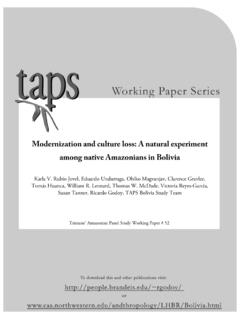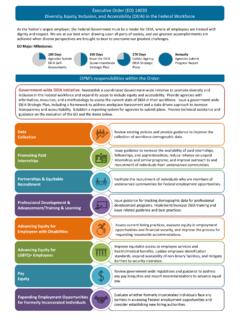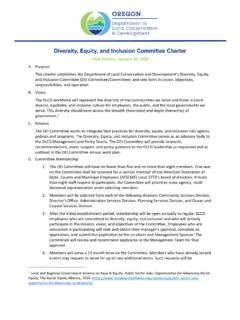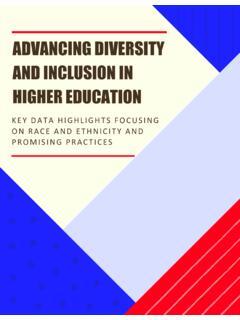Transcription of Diversity, Equity, and Inclusion (DEI) Organizational ...
1 diversity , equity , and Inclusion (DEI). Organizational Assessment Tools: A Resource Guide June 2021. Prepared by Trinidad Tellez, MD, Principal, [Health] equity Strategies, LLC, in partnership with the Institute for Economic and Racial equity , Brandeis University IERE. diversity , equity , and Inclusion (DEI) Organizational Assessment Tools: A Resource Guide Overview This is a point-in-time snapshot of instruments from the rapidly evolving feld of diversity , equity , and Inclusion (DEI) created in 2021. This resource guide provides: a list of assessments by organization type;. an overview of the benefts + and limitations ~ of each assessment, to assist in selection; and direct links and references to encourage further reading. Content was drawn primarily from searching the grey literature in January 2021. Instruments were chosen based on potential utility for the Institute for Economic and Racial equity 's (IERE) evaluation of the HEAL Winchendon initiative, a Moving Massachusetts Upstream (MassUP).
2 Project, recency (the majority were created in the last 10 years), and refection of a diversity of disciplines, domains, and sectors. Purpose This resource guide is designed to assist organizations and coalitions in a change process to identify, defne, and achieve goals related to diversity , equity , Inclusion , and racial justice. It is appropriate for a wide range of organizations from across the health and healthcare, human and social service, education (K-12), and non-proft sectors. Because of the continual evolution of the DEI feld as well as the variation of terms used historically in diferent disciplines, instruments may refer to cultural and linguistic competence, cultural efectiveness, equity , DEI, and/or justice. Organizational assessments provide a benchmark to inform quality improvement eforts, recognizing that change is an adaptive process that takes time. All of the instruments included in this list outline a set of dimensions through which DEI is assessed, with specifc indicators to refect the extent to which DEI is put into practice.
3 They are designed for assessment at the Organizational level, not the individual level. For individual assessment resources, see Georgetown University's National Center for Cultural Competence.*. The project described here was supported by an Investment Award from the Commonwealth of Massachusetts Health Policy Commission (HPC). The contents of this resource guide are the sole responsibility of the authors and do not necessarily represent the views of the HPC. * How to Use Organizational Assessments Assessment instruments are intended for organizations that are ready to assess and refect on their status and progress towards DEI goals. Organizations and coalitions that conduct their own processes of exploration and interrogation can beneft from assessments as one of many tools. Assessments should be used as a basis for dialogue, and as part of a strategic change process. The Georgetown University National Center for Cultural Competence lists the following Guiding Principles of Self-Assessment for organizations and individuals.
4 Self-assessment is a strengths-based model ;. A safe and non-judgmental environment is essential to the self-assessment process ;. Self-assessment ensures the meaningful involvement of consumers, community stakeholders and key constituency groups ;. The results of self-assessment are used to enhance and build capacity ;. Diverse dissemination strategies are essential to the self-assessment process.. Organizations can use these tools to facilitate ongoing dialogue and Organizational change. Assessment results can be used to pinpoint areas for further exploration or to conduct ongoing monitoring. It is highly valuable to have multiple people in an organization share diferent perspectives; this provides an opportunity and space to refect on and debrief people's opinions. Results can provide valuable insight into areas of strength and areas of opportunity for growth. An assessment tool provides the foundation for important discussion and action. By using assessment tools, organizations can then set strategic DEI priorities.
5 equity Impact Assessments (EIA) or equity Impact Review (EIR) Tools It is important to diferentiate Organizational assessments from instruments called equity Impact Assessments (EIA) or equity Impact Review (EIR) Tools, which outline processes to be employed when conceiving new projects and policies. Because these are also important tools for promoting equity , a few are included in the fnal section of this resource guide. According to Race Forward, A Racial equity Impact Assessment (REIA) is a systematic examination of how diferent racial and ethnic groups will likely be afected by a proposed action or decision. REIAs are used to minimize unanticipated adverse consequences in a variety of contexts, including the analysis of proposed policies, institutional practices, programs, plans and budgetary decisions. The REIA can be a vital tool for preventing institutional racism and for identifying new options to remedy long-standing inequities.. Why This Resource Guide, and Why Now This resource guide was compiled by Trinidad Tellez, MD, Principal, [Health] equity Strategies, LLC for the Institute for Economic and Racial equity at Brandeis.
6 IERE is the evaluation partner for the HEAL Winchendon initiative, a Moving Massachusetts Upstream (MassUP) grantee. Jessica Santos, PhD, Principal Investigator, and Danielle Chun, Project Director, provided input, shared an early version of this tool with HEAL. Winchendon partners, and utilized it to inform one aspect of IERE's evaluation. While developed to support the eforts of HEAL Winchendon, the resource guide is also designed to serve as a public resource.. Resource Guide General - p. 1-4 Educational Organizations K-12 - p. 8. Institutional Assessment Quiz 1 JustPartners, Inc. (JPI), of Baltimore, MD 15 equity Audit from the Mid-Atlantic equity Consortium (MAEC). Race Matters: Organizational Self-Assessment Building For equity School Self-Assessment Tool 2 Annie E. Casey Foundation 16 Center for Collaborative Education Internal Scan: 2020 Racial equity and Inclusion Capacity Survey 3 Living Cities Workforce Development Organizations - p. 9. Culturally Efective Organizations Framework Organizational Assessment Workforce Development Racial equity Readiness 4 New Hampshire equity Collective, Culturally Efective Organizations Work Group 17 Assessment Tool Washington Race equity & Justice Initiative (REJI) Organizational Assessment Race Forward & Center for Social Inclusion (CSI).
7 5 JustLead Washington Inclusive Dubuque's Self-Assessment for diversity , equity and Inclusion (DEI) City Government - p. 10. 6 Inclusive Dubuque Austin equity Assessment Tool 18 City of Austin equity Ofce equity Organizational Self-Assessment 7 ABLe Change, Michigan State University Portland Racial equity Roadmap Assessment Racial Justice Assessment Tool 19 City of Portland, OR, Ofce of equity and Human Rights 8 Western States Center 9. Working Principles for Health Justice & Racial equity Organizational Self-Assessment Local Health Departments - p. 11. The Praxis Project Local Health Department Organizational Self- 10. diversity , equity , and Inclusion Spectrum Tool 20 Assessment for Addressing Health Inequities Meyer Memorial Trust Bay Area Regional Health Inequities Initiative (BARHII). Child & Youth Serving Organizations - p. 5-6 Healthcare Providers - p. 11-12. Tool for Organizational Self-Assessment Related to Racial equity 11 Eliminating Disparities in Child & Youth Success Collaborative 21.
8 Cultural and Linguistic Competence Policy Assessment Georgetown University National Center for Cultural Competence Cultural and Linguistic Competence Family Organization Assessment Instrument 12 Georgetown University National Center for Cultural Competence 22 HRET HIIN Health equity Organizational Assessment (HEOA). Health Research and Educational Trust CLC Assessment Tool: Based on the National Standards for Culturally and Inclusion Scorecard for Population Health (ISPH). 13 Linguistically Appropriate Services in Health and Health Care (CLAS Standards) 23 Impact4 Health Lauren Acevedo, Covian Consulting for SAMHSA & TA-Network Disability Organizations - p. 7 Food Security Organizations - p. 13. The Cultural and Linguistic Competence Assessment for Racial equity Chapter (10) of the Self-Assessment Workbook 14 Disability Organizations (CLCADO) 24 for the Hunger Free Communities Network Georgetown University National Center for Cultural Competence Alliance to End Hunger Race equity Impact Assessment / equity Impact Review Tools - p.
9 14-15. General + Benefts ~ Limitations Institutional Assessment Quiz1 2009. 1 JustPartners, Inc. (JPI), of Baltimore, MD. Pages 31-34 of the Annie E. Casey Foundation's RESPECT's advancing the Mission: Tools for equity , diversity and Inclusion Toolkit . (2009). The Institutional Assessment Quiz tool helps identify where an organization is on a four-point learning continuum and provides a quick benchmark. + Very simple instrument with 28 items on one page in four domains which are checked to see what place the organization is in. It is part of a toolkit that tells the RESPECT story, a journey that we feel has lessons for the feld of philanthropy and other organizations that are committed to addressing these issues. 1. ~ Slightly tailored to funders. Limited as really just assessing seven questions. Race Matters: Organizational Self-Assessment2 January 2006. 2 Annie E. Casey Foundation Straightforward two-page tool with nine questions related to Staf Competencies and 10 questions on Organizational Operations to yield a Racial equity Score and recommended Next Steps.
10 + Simple-to-use instrument. ~ Original instrument has tiny font with mixed-directions layout; there is a larger font version 1. 2. 3. 1. + Benefts ~ Limitations Internal Scan: 2020 Racial equity and Inclusion Capacity Survey4 2020. 3 Living Cities This is the fourth annual survey of staf to track our Organizational progress toward building our competencies and advancing racial equity at Living Cities. 4 The questions .. are adapted from GARE's Employee Survey for Local Governments, D5 initiative's Field Survey, Vanessa Daniels' piece More is Required of Us, as well as best practices from the feld. 5. + Straightforward 29 questions. Recommend felding every two years. The survey allows the following learning from staf: Understand where we need to invest in staf training to increase competency around racial equity ;. Understand our collective awareness on racial equity and how it impacts our work ; and Understand collective awareness of Living Cities' eforts around racial equity 4.








